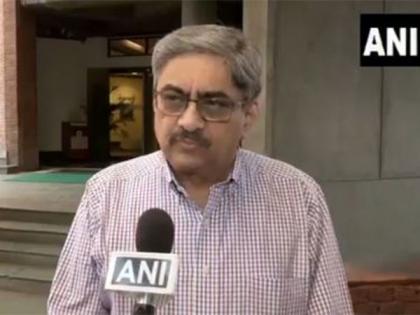India must act in national interest, not be swayed by UNSC, says Former Indian envoy to China
By ANI | Updated: May 6, 2025 19:27 IST2025-05-06T19:23:43+5:302025-05-06T19:27:33+5:30
New Delhi [India], May 6 : Following the closed-door discussions at the United Nations Security Council (UNSC) on the ...

India must act in national interest, not be swayed by UNSC, says Former Indian envoy to China
New Delhi [India], May 6 : Following the closed-door discussions at the United Nations Security Council (UNSC) on the Kashmir issue, former Indian Ambassador to China, Gautam Bambawale, firmly asserted that India must act in its own national interest, without being influenced by international responses.
While acknowledging the global concern over India's actions in Kashmir, Bambawale noted that although the international community, including UNSC members, has called for restraint, India must continue to pursue its policies based on its national objectives.
While speaking with ANI, Bambawale said, "I have not followed what the UNSC has decided or said very closely. But I feel that India should do whatever it wants to do and needs to do, in its own national interest. We should not place too much importance on what the UNSC and members of the UNSC are saying or not saying. We need them on our side, but at the same time, we must take our action as we deem fit and based on India's national interest."
He added, "The international community has condemned the action, but you must also note that the international community is continuously saying that India and Pakistan must show restraint, and I believe that in this particular case that India should do what it has to do in its own national interest without putting too much importance on what other countries are saying or doing."
Pakistan had called for an emergency UNSC consultation under severe international pressure following the Pahalgam attack. However, in the closed-door meeting held in New York, UNSC members raised tough questions for Pakistan, sources in New York told ANI.
The members refused to accept the "false flag" narrative planted by the Pakistani side and asked whether the Lashkar-e-Taiba, a proscribed terror organisation with deep ties to Pakistan, was likely to be involved in the terror attack, they said.
Sources said there was broad condemnation of the terrorist attack and recognition of the need for accountability. Some members specifically brought up targeting of tourists on the basis of their religious faith.
There was no statement published by the UN body following the "closed consultations" that was requested by Pakistan, a non-permanent member of the Council.
On Monday, United Nations Secretary General Antonio Guterres called for "maximum restraint," saying that a "military solution is no solution."
Extending UN's complete support to promotes de-escalation diplomacy and renewed commitment to peace, Antonio Guterres advised the both nations to avoid military confrontation "that could easily spin out of control."
Condemning the attack Guterres expressed grief over the relation between both counties reaching to a "boiling" point.
"Tension between India and Pakistan are at their highest in years. It pains me to see the relation reaching a boiling point. I understand the raw feeling following the awful terror attack in Pahalgam on April 22. I once again strongly condemn the attack and extends my condolences to the families of the victim. Targeting civilians is unacceptable and those responsible must be brought to justice," Guetters said.
"It is also essential at this critical hour to avoid military confrontation that could easily spin out of control. It is time for maximum restraint and stepping back from the brink. That has been my message in my ongoing outreach with both countries. Make no mistake, a military solution is no solution. United Nations stand ready to support any initiative that promotes de-escalation diplomacy and renewed commitment to peace," he added.
Disclaimer: This post has been auto-published from an agency feed without any modifications to the text and has not been reviewed by an editor
Open in app